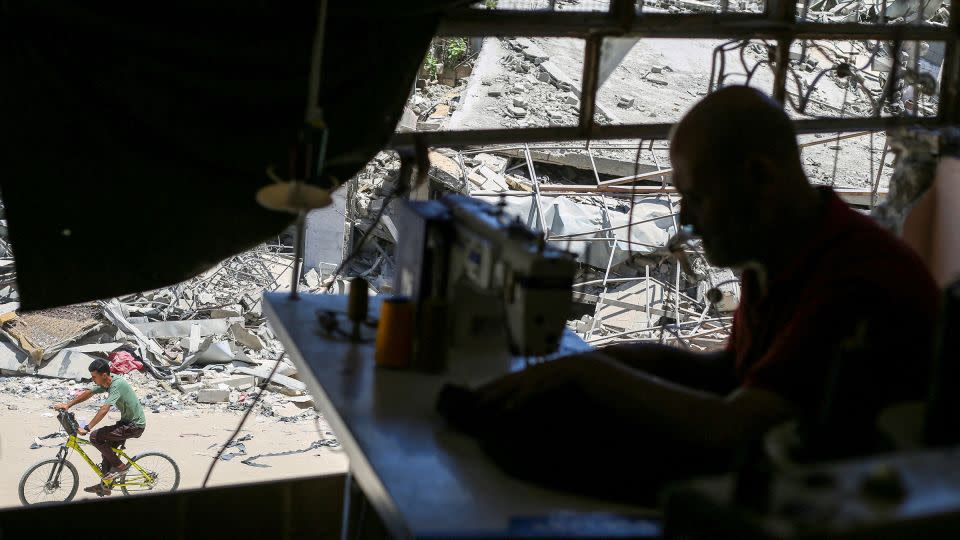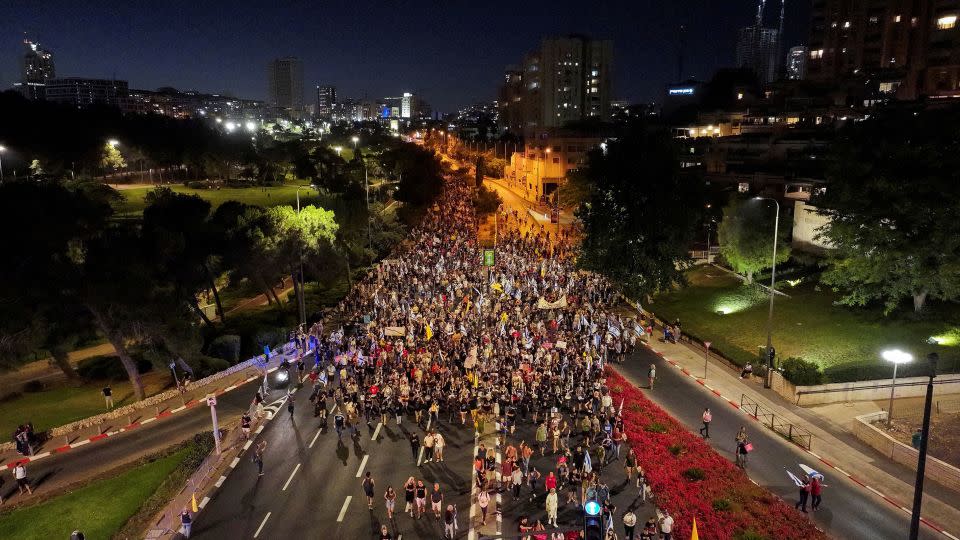Gaza hostage-ceasefire deal faces new hurdles as Israel sets conditions. Here’s what to know
- Oops!Something went wrong.Please try again later.
- Oops!Something went wrong.Please try again later.
Editor’s Note: A version of this story appears in CNN’s Meanwhile in the Middle East newsletter, a three-times-a-week look inside the region’s biggest stories. Sign up here.
Optimism about an Israel-Hamas ceasefire-hostage agreement waned this week as Israel set conditions for the deal and Hamas warned that Israeli actions in Gaza could jeopardize the talks.
Last week, a US official told CNN that a framework agreement is “in place” and an Israeli official said that Prime Minister Benjamin Netanyahu had authorized his negotiators to enter into detailed negotiations, signaling a potential breakthrough. Talks resumed in the Qatari capital Doha on Friday. Over the weekend, Hamas agreed to compromise on a major sticking point for Israel, that the Jewish state commit to a permanent ceasefire in Gaza before signing an agreement.
But a statement by the Israeli prime minister’s office on Sunday cast doubt on whether the deal would progress, laying out several “principles” Israel is not prepared to abandon, including resumed fighting in Gaza “until all of objectives of the war have been achieved.”
Israel launched its war on Gaza nine months ago, in response to Hamas’ October 7 attack that killed 1,200 people and took more than 250 others hostage, according to Israeli authorities. The war has left swathes of the enclave unrecognizable, displaced almost the entire population and killed more than 38,000 people in Gaza, according to the health ministry there. Israel had said it wouldn’t end the war until all hostages are freed and Hamas is eliminated.
Some experts say Netanyahu’s statement on Sunday suggests the deal may face new hurdles.
The prime minister’s conditions block “any possibility of progress from the Israeli side,” Gershon Baskin, a former Israeli hostage negotiator who once acted as a channel to Hamas, told CNN, adding that the conditions were “completely against what Hamas’ demands are.”
“I don’t think that Hamas will give in to additional Israeli demands,” such as staying on the Philadelphi Corridor, Baskin said, referring to the 14-kilometer (about 8.7-mile) buffer zone on the Egypt-Gaza border. Hamas is also unlikely to agree to an Israeli demand of “a veto on the selection of Palestinian prisoners to be released.”
Here’s what we know about where the talks stand.
What is the deal that is on the table?
US President Joe Biden in May laid out a three-phase proposal that he said Israel had submitted, as he declared “it’s time for this war to end.”
The first phase of the potential agreement would last six weeks and include the “withdrawal of Israeli forces from all populated areas of Gaza” as well as the “release of a number of hostages, including women, the elderly, the wounded in exchange for the release of hundreds of Palestinian prisoners.” Phase 2 would allow for the “exchange for the release of all remaining living hostages, including male soldiers.” In Phase 3, the president said, a “major reconstruction plan for Gaza would commence and any final remains of hostages who’ve been killed will be returned to their families.”

On Thursday, a senior US administration told CNN that the framework for a deal is “now in place,” following a call between Biden and Netanyahu. An Israeli source familiar with the negotiations echoed a similar message earlier on Wednesday, telling CNN the two sides appear to be on the brink of a framework agreement.
What is Hamas’ position?
Hamas has long demanded that Israel agree to a permanent ceasefire before signing any deal, which Israel has so far refused.
A senior Hamas official – who had been involved in negotiations – told CNN Saturday the group would instead accept that talks on reaching a permanent ceasefire would take place throughout the first phase of any deal, which would last six weeks.
This means, in the first phase, mediators would guarantee a temporary truce, the delivery of humanitarian aid to Gaza and the withdrawal of Israeli troops. Indirect talks would continue towards implementing the second phase of the agreement.
But as Israel issued new evacuation orders in Gaza city on Sunday, Hamas said on Monday that the move threatens to return the negotiating process to “point zero.”
Netanyahu and his army bear full responsibility for the collapse of this negotiation path,” the head of the group’s political bureau, Ismail Haniyeh, said.
What is Netanyahu’s position?
An Israeli source familiar with the negotiations told CNN last week that Israeli officials believe Hamas’ latest response will enable the two parties to enter detailed negotiations to reach an agreement. Netanyahu subsequently authorized his negotiators to enter into detailed talks in a bid to broker a deal, an Israeli official and a source familiar with the negotiations said, signaling progress after weeks of deadlock.
In a statement Sunday, however, Netanyahu’s office published a list of principles that it said will not be infringed upon by the plan agreed to by Israel and Biden. The prime minister’s “steadfast position” against calls to halt Israeli military action in the southern Gaza city of Rafah is what brought Hamas to the negotiating table, the statement said.
The principles include a resumption of the war until “all of objectives of the war have been achieved” and the prevention of “smuggling of weapons to Hamas from Egypt to the Gaza border.”
Israel began a ground operation in Rafah on May 7, crossing the Philadelphi Corridor and seizing the Palestinian side of the border with Egypt. Israel has long accused Hamas of using the Philadelphi corridor to smuggle weapons from Egypt.
Netanyahu also said there will be “no return of thousands of armed terrorists to the northern Gaza Strip,” the statement said.
What is the White House saying?
A US official told CNN Thursday that last week’s call between Biden and Netanyahu seemed to reach a “breakthrough” on the transition from Phase 1 to Phase 2, adding that the deal is now “very consistent” with what Biden had laid out in May.
Asked if the administration believes that Netanyahu is playing politics and could try to sabotage the deal, the official said the deal is structured in a way that “fully protects Israel’s interests.”
The developments came after the US proposed new language to help bridge gaps in discussions for a deal, and as Biden scrambled for political survival after floundering in a presidential debate against his predecessor Donald Trump. Biden’s handling of the Israel-Hamas conflict has been a key issue for voters.
Are the two sides closer to a deal?
Prospects of a deal appeared to become distant again this week after Netanyahu’s demands, as senior Israeli politicians from accross the political spectrum publicly chided the prime minister over his handling of the war and the hostage talks.
Far-right members of Netanyahu’s government, whom he relies on to keep his government intact, warned him against making compromises with Hamas.
Minister of National Security Itamar Ben Gvir warned that a negotiated settlement is a “surrender to terrorism on all fronts,” and said “the prime minister conducts himself as a one-man government, making decisions by himself, and excluding his natural partners in the government, including cabinet meetings that are without any significant content,” describing the situation as “intolerable.”
Finance Minister Bezalel Smotrich, told his party that the proposed outline of a ceasefire deal was a defeat and humiliation for Israel and a victory for Sinwar,” Hamas’ leader in Gaza.
“We will not be part of a deal to surrender to Hamas,” Smotrich said. “The people of Israel, the bereaved families and the IDF fighters demand victory. We must not disappoint them. We must not endanger the country.”
Meanwhile, the chairman of the National Unity party, Benny Gantz, who left the war cabinet last month after repeated disagreements with Netanyahu, accused the prime minister of prioritizing the survival of his government over bringing back the hostages.
“Yesterday the prime minister linked bringing back the hostages to bringing down the government. Today, Ben Gvir connects a seat in the limited cabinet with political votes in the Knesset. Israel’s security during the most difficult campaign in its history became a victim of political whims.”
Opposition leader Yair Lapid criticized the prime minister’s statement as “provocative.”
“What is it good for? We are at a critical moment in the negotiations, the lives of the abductees depend on it,” Lapid wrote Sunday on X. “Why issue such provocative messages? How does it contribute to the process?”
“There’s a hostage deal on the table,” he said later. “It is not true that Netanyahu has to choose between the hostage deal and his continued tenure as prime minister. I promised him a safety net, and I will keep that promise. If Smotrich and Ben Gvir retire, he will get a safety net.”

Baskin, the former negotiator, said that added US pressure is unlikely to sway the Israeli prime minister, who is battling for political survival amid anti-government protests demanding his resignation.
US pressure is “strongly diminished now” after Biden’s debate against Trump, Baskin said. Biden’s weak debate performance only led more Democrats to express doubts that he can beat his opponent in the upcoming election.
“If the Americans are still optimistic (after Netanyahu’s Sunday statement), then they are really living in La La land,” Baskin told CNN. “They have really no idea what is going on in the mind of Netanyahu.”
CNN’s Jeremy Diamond, Samantha Waldenberg and Arlette Saenz contributed to this report.
For more CNN news and newsletters create an account at CNN.com

